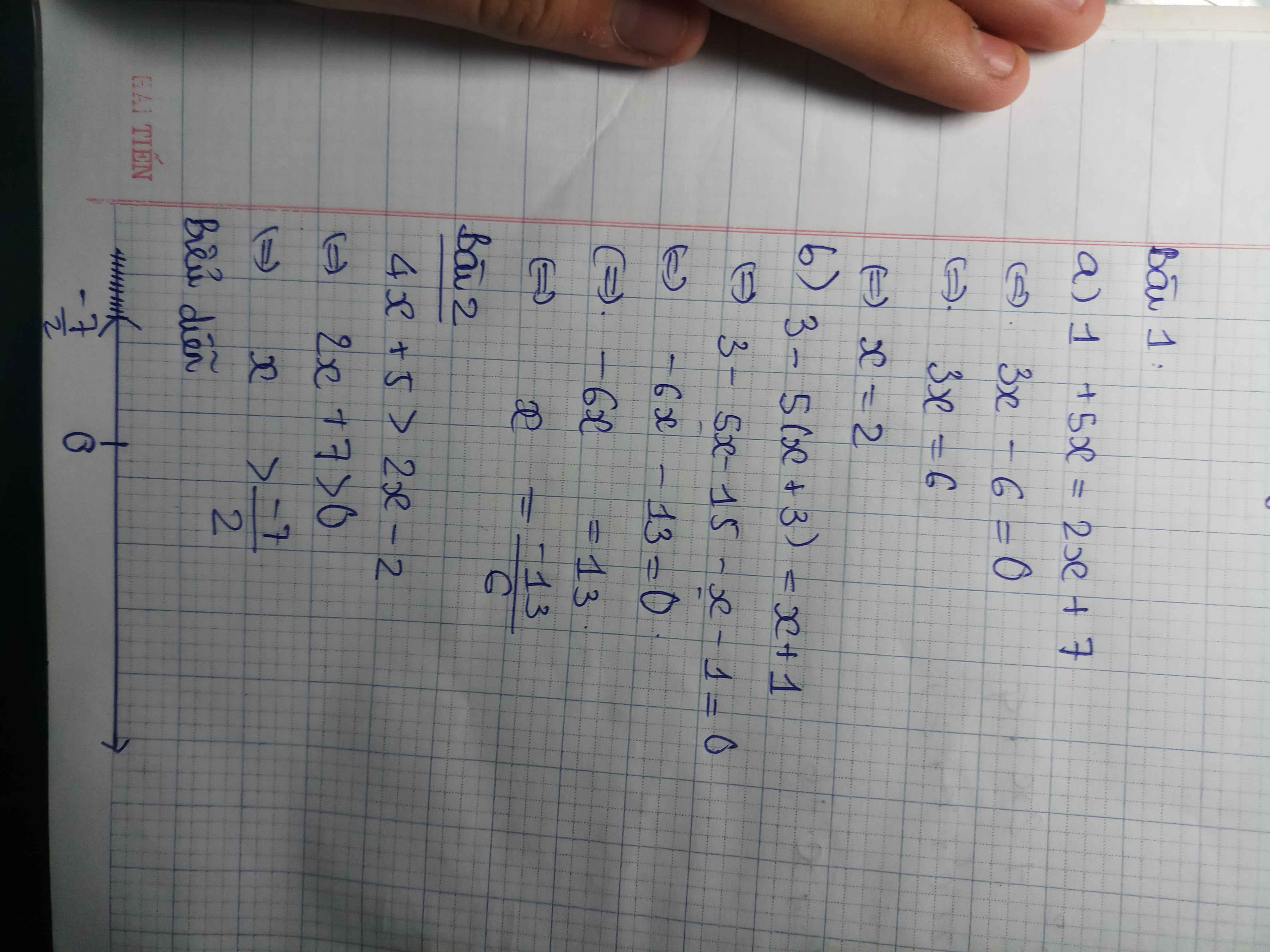Giải bất phương trình: -x^2+4x-5<0

Những câu hỏi liên quan
giải bất phương trình sau :
|-4x| - 5 = x + 2
Bài 1: Giải các bất phương trình và phương trình sau :
a) 2(3-4x) = 10-(2x – 5)
Giải các bất phương trình và phương trình sau :
a) 3(2-4x) = 11-(3x – 1)
Bài 1:
a) Ta có: \(2\left(3-4x\right)=10-\left(2x-5\right)\)
\(\Leftrightarrow6-8x-10+2x-5=0\)
\(\Leftrightarrow-6x+11=0\)
\(\Leftrightarrow-6x=-11\)
hay \(x=\dfrac{11}{6}\)
b) Ta có: \(3\left(2-4x\right)=11-\left(3x-1\right)\)
\(\Leftrightarrow6-12x-11+3x-1=0\)
\(\Leftrightarrow-9x-6=0\)
\(\Leftrightarrow-9x=6\)
hay \(x=-\dfrac{2}{3}\)
Đúng 2
Bình luận (0)
Bài 1: Giải phương trình và bất phương trình sau: 1. 5.(2-3x). (x-2) = 3.( 1-3x) 2. 4x^2 + 4x + 1= 0 3. 4x^2 - 9= 0 4. 5x^2 - 10=0 5. x^2 - 3x= -2 6. |x-5| - 3= 0
Bài I: 1) Giải các phương trình a/8 + 4x = 3x – 1
2) Giải các bất phương trình a) 10 - 5(x + 3) > 3(x - 1)
1) Ta có: \(4x+8=3x-1\)
\(\Leftrightarrow4x-3x=-1-8\)
\(\Leftrightarrow x=-9\)
2) Ta có: \(10-5\left(x+3\right)>3\left(x-1\right)\)
\(\Leftrightarrow10-5x-15-3x+3>0\)
\(\Leftrightarrow-8x>2\)
hay \(x< \dfrac{-1}{4}\)
Đúng 1
Bình luận (0)
Giúp vs ạBài 1 giải các bất phương trình saua.x2 - x - 6 0b.2x2 - 7x + 5 0c.3x2 - 9x + 6 ≥ 0d.2x2 - 5x + 3 0Bài 2 Giải phương trình sauA.√x2 + x + 5 √2x2 - 4x + 1B.√11x2 -14x - 12 √3x2 + 4x - 7
Đọc tiếp
Giúp vs ạ
Bài 1 giải các bất phương trình sau
a.x2 - x - 6 = 0
b.2x2 - 7x + 5 < 0
c.3x2 - 9x + 6 ≥ 0
d.2x2 - 5x + 3 < 0
Bài 2 Giải phương trình sau
A.√x2 + x + 5 = √2x2 - 4x + 1
B.√11x2 -14x - 12 = √3x2 + 4x - 7
Bài 2:
a: =>2x^2-4x+1=x^2+x+5
=>x^2-5x-4=0
=>\(x=\dfrac{5\pm\sqrt{41}}{2}\)
b: =>11x^2-14x-12=3x^2+4x-7
=>8x^2-18x-5=0
=>x=5/2 hoặc x=-1/4
Đúng 0
Bình luận (0)
Giải bất phương trình
\(\dfrac{x^2+2x+2}{x+1}\ge\dfrac{x^2+4x+5}{x+1}-1\)
ĐKXĐ : x khác -1
\(\dfrac{x^2+2x+2}{x+1}\ge\dfrac{x^2+3x+4}{x+1}\\ \Leftrightarrow\dfrac{x^2+2x+2}{x+1}\ge\dfrac{x^2+2x+2}{x+1}+\dfrac{x+2}{x+1}\\ \Leftrightarrow\dfrac{x+2}{x+1}\le0\\ \Leftrightarrow x+2\ge0;x+1< 0\Leftrightarrow-1>x\ge-2\)
Đúng 0
Bình luận (0)
Giải phương trình : 4x2 - 4x - 5|2x-1| - 5 = 0
Giải bất phương trình : (2x2 + 3x + 4)2 - (x2 +x +4)2 >0
\(4x^2-4x-5\left|2x-1\right|-5=0\)
\(\Leftrightarrow-5\left|2x-1\right|=5-4x^2+4x\)
\(\Leftrightarrow\left|2x-1\right|=\frac{-4x^2+4x+5}{-5}\)
\(\Leftrightarrow\left|2x-1\right|=\frac{4x\left(x-1\right)}{5}-1\)
TH1 : \(2x-1=\frac{4x\left(x-1\right)}{5}-1\Leftrightarrow2x=\frac{4x\left(x-1\right)}{5}\)
\(\Leftrightarrow10x=4x^2-4x\Leftrightarrow14x-4x^2=0\)
\(\Leftrightarrow-2x\left(2x-7\right)=0\Leftrightarrow x=0;x=\frac{7}{2}\)
TH2 : \(2x-1=-\left(\frac{4x\left(x-1\right)}{5}-1\right)\Leftrightarrow2x-1=-\frac{4x\left(x-2\right)}{5}+1\)
\(\Leftrightarrow2x-2=-\frac{4x\left(x-2\right)}{5}\Leftrightarrow10x-10=-4x^2+8x\)
\(\Leftrightarrow2x-10+4x^2=0\Leftrightarrow2\left(2x^2+x-5\ne0\right)=0\)tự chứng minh
Vậy tập nghiệm của phương trình là S = { 0 ; 7/2 }
1) Giải các phương trình sau : a) x-3/x=2-x-3/x+3 b) 3x^2-2x-16=0 2) Giải bất phương trình sau: 4x-3/4>3x-5/3-2x-7/12
\(a,\dfrac{x-3}{x}=\dfrac{x-3}{x+3}\)\(\left(đk:x\ne0,-3\right)\)
\(\Leftrightarrow\dfrac{x-3}{x}-\dfrac{x-3}{x+3}=0\)
\(\Leftrightarrow\dfrac{\left(x-3\right)\left(x+3\right)-x\left(x-3\right)}{x\left(x+3\right)}=0\)
\(\Leftrightarrow x^2-9-x^2+3x=0\)
\(\Leftrightarrow3x-9=0\)
\(\Leftrightarrow3x=9\)
\(\Leftrightarrow x=3\left(n\right)\)
Vậy \(S=\left\{3\right\}\)
Đúng 1
Bình luận (0)
\(b,\dfrac{4x-3}{4}>\dfrac{3x-5}{3}-\dfrac{2x-7}{12}\)
\(\Leftrightarrow\dfrac{4x-3}{4}-\dfrac{3x-5}{3}+\dfrac{2x-7}{12}>0\)
\(\Leftrightarrow\dfrac{3\left(4x-3\right)-4\left(3x-5\right)+2x-7}{12}>0\)
\(\Leftrightarrow12x-9-12x+20+2x-7>0\)
\(\Leftrightarrow2x+4>0\)
\(\Leftrightarrow2x>-4\)
\(\Leftrightarrow x>-2\)
Đúng 1
Bình luận (0)
Bài 1.*) Giải phương trình a) 1 + 5x 2x + 7 b) 3 – 5(x+3) x + 1 c) **) Giải bất phương trình và biểu diễn tập nghiệm trên trục số a) 4x + 5 2x – 2 b) 2 (x - 2) 5x + 2 (mũi tên kia thêm gạch ngang câub) giúp mình nha :))
Đọc tiếp
Bài 1.*) Giải phương trình
a) 1 + 5x = 2x + 7 b) 3 – 5(x+3) = x + 1 c)![]()
**) Giải bất phương trình và biểu diễn tập nghiệm trên trục số
a) 4x + 5 > 2x – 2 b) 2 (x - 2) < 5x + 2 (mũi tên kia thêm gạch ngang câub) giúp mình nha :))


















